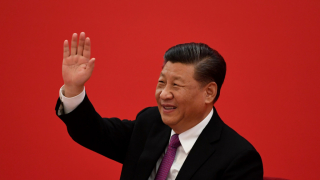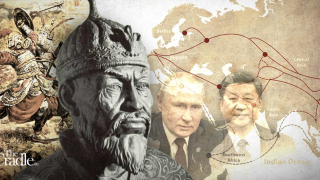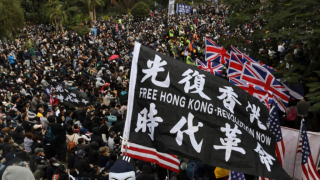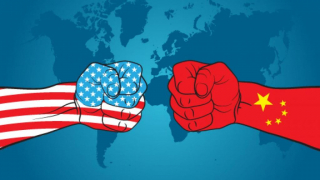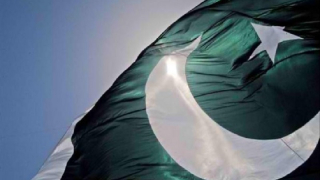Pakistan-China Relations: The Epitome of Friendly Coexistence
06.08.2020
October 2020 will mark the 71st anniversary of the founding of the People's Republic of China (PRC). In the past seventy years, China's progress in economic, military, political and social domains have been nothing short of tremendous. With a national gross domestic product (GDP) close to US$ 13.37 trillion in 2020, China stands as world's second largest economy which is approximately one-sixth of the entire global GDP.
China's successes are not limited to the economic, military and social domains. With its independent foreign policy and the ideology of peaceful development, China has amassed important achievements in the field of diplomacy as well. Thanks to such sincere and effective diplomatic efforts, China now has friends in all continents and parts of the world.
But there is one relationship in particular that stands out, especially in an era where pragmatism, realpolitik and interests reign supreme and there is hardly any emotions or cordiality involved, and that is the Pakistan-China friendship.
Rightly termed as "Iron Brothers", Pakistan and China are traditional allies and the friendship between the people can be traced back two thousand years ago. PRC gained independence in October of 1949 and shortly after, Pakistan was one of the first countries to recognize the country and diplomatic relations between the two were established in May of 1951.
Since the establishment of formal diplomatic relations, Pakistan and China became all-weather and all-dimensional strategic cooperative partners in the international community, all thanks to the efforts and cooperation by the governments and people of the two countries. The terminology of 'all-weather' points to the fact that Pakistan and China have always stood by each other and extended unconditional support to one another on issues pertaining to their respective core interests. Furthermore, this support has been there regardless of the changing global circumstances or their complexity, withstanding all tests of time.
Moreover, the term 'all-dimensional' denotes that the Pak-China relationship covers all aspects and that comprehensive cooperation exists between the governments, people and all communities of both the countries. Therefore, Pak-China relationship has become the epitome of cordial relations between two countries with completely distinct social & political systems and cultural backgrounds.
Entering into the 21st century, Pak-China relations also entered into a new phase of development with several significant cooperative agreements signed between their respective governments namely, ‘Treaty of Friendship, Cooperation and Good Neighbourly Relations’ in 2005, and ‘China- Pakistan Free Trade Agreement’ in 2006 and 2009. The most important of all, during his state visit to Pakistan in May 2013, the Chinese Premier Li Keqiang initiated the construction of China-Pakistan Economic Corridor (CPEC) which is the flag-ship corridor of the overall Chinese Belt and Road Initiative (BRI).
Later on, Chinese President Xi Jinping suggested the initiative of doing a joint-venture of building the Silk Road Economic Belt and the 21st Century Maritime Silk Road and termed CPEC as one of the major projects of the BRI.
The materialization of the CPEC project in record time is without a doubt a big milestone in the development of Pak-China relations. This project has linked China’s Xinjiang autonomous region and Gwadar Port in Pakistan’s Balochistan region. These two regions were amongst the most under-developed regions in China and Pakistan respectively that now have new opportunities of development and have gained unprecedented significance as well. The CPEC project is playing an important role in Pakistan's economic, social and political development that will soon transform Pakistan into a geo-economic centre.
On international forums such as the United Nations, both Pakistan and China have always backed each others' stances and been on the same page. Be it the inclusion of Pakistan into the Nuclear Suppliers Group (NSG) or stopping international bullies from alienating Pakistan by including it in the 'blacklist' of the Financial Action Task Force (FATF), China has always stood by Pakistan during such circumstances. Likewise, Pakistan has also supported China's stance with regards to Tibet, Hong Kong and South China Sea.
Pakistan not only introduced China to the Muslim world but was also instrumental in resumption of China-US diplomatic channels back in July 1971. On the issue of Jammu & Kashmir dispute, China has always stood with the people of Indian Occupied Kashmir (IOK) and raised its concerns regarding the Indian atrocities and transgressions in the disputed region.
Defence cooperation between Pakistan and China has also touched new heights. There have always existed a robust system of intelligence sharing between the two countries which have proved vital in strengthening of this strategic relationship. Besides regular military exercises, Pakistan and China frequently embark on joint ventures to develop new and advanced military equipment and technology. The JF-17 Thunder fighter jet is a manifestation of such joint efforts. Military and intelligence chiefs of both countries pay regular visits to each other to further enhance cooperation and improve understanding.
The great thing about Pak-China friendship is the profound goodwill and mutual respect that exist between the people of both countries for each other. Whenever Pakistan or China have been struck with any natural or man-made calamities, both countries have always been the first to respond to each others' calls for help. China's help to Pakistan during the 2005 earthquake, 2012 floods and the recent COVID-19 spread are some of the notable examples where the government and the people of China extended their assistance and cooperation to the people and state of Pakistan.
Furthermore, besides material help, China is also helping Pakistan in developing new infrastructure (reservoirs, power projects, railway network, roads and economic zones) and improving the existing ones (case and point, Diamer Bhasha Dam for one). Unlike other partners, China's assistance to Pakistan does not have any strings attached. China is helping Pakistan to stand on its feet, especially economically which will not only help Pakistan to progress socially and economically but will also aid Pakistan in having an independent foreign policy, free from external pressures.
In general, it is safe to say that Pakistan and China share a common destiny. The love and respect for each other is deeply rooted in the hearts of the people of Pakistan and China. Regardless of the changes in the international arena, Pakistan and China have proved that love and respect trumps all else that suggests that such a friendship cannot exist in world affairs. The Pak-China strategic cooperation, the first and only of its kind, has a deep and strong foundation with a vast potential for an even greater cooperation and development which has grown strength to strength. And to the dismay of the antagonists of Pak-China friendship, this cooperation will not only deepen with years to come, but it will continue for generations to come.




